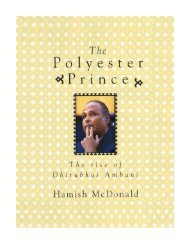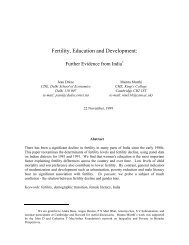You also want an ePaper? Increase the reach of your titles
YUMPU automatically turns print PDFs into web optimized ePapers that Google loves.
interest in various ways, Dhirubhai’s standard gratuity was a suit or sari length of<br />
material made by his factory Gradually Dhirubhai also learned the channels for largescale<br />
political donations in the top echelons.<br />
In 1966, Indira Gandhi had become prime minister following the sudden death in<br />
Tashkent of Lal Bahadur Shastri, who had been India’s leader since the death of her<br />
father Jawaharlal Nehru in 1964. With her only ministerial experience the<br />
Information portfolio under Shastri, but a lifetime of watching her father and her late<br />
husband Firoze Gandhi in politics, Indira was well versed in Congress Party<br />
machinations but had a shallow grasp of policies. Power steadily exacerbated a deep<br />
psychological insecurity and a melancholic nature that led her to place inordinate<br />
trust on unworthy people in her inner circle, as well as on her headstrong son<br />
Sanjay, who was extorting funding for his pet scheme of developing an indigenous<br />
‘people’s car’s .<br />
Among the sweeping economic changes of 1969 was one small legislative<br />
amendment that had the effect of entrenching corruption, though its ostensible<br />
intention had been the opposite. Until then, a section of the Companies Act allowed<br />
directors to make political contributions to any party. This was repealed in 1969. As<br />
on of the officials who supervised the amendment later admitted, this led to political<br />
payments by black money. Companies had to generate black funds by under/over<br />
invoicing, fictitious sales etc. A pattern of wholesale corruption and large-scale<br />
corporate malpractices, through double-accounting, over- invoicing and underinvoicing,<br />
came into being, creating massive unaccounted-for and therefore untaxed<br />
funds.” One of the conduits to Indira Gandhi was a private secretary named Yashpal<br />
Kapur, a Hindu the Western Punjab in the 1947 Partition who displayed all the<br />
financially grasping tendencies this community brought across to Delhi. In all these<br />
Years, her memoir of the Nehru and Indira Gandhi years, the well-connected<br />
magazine publisher Raj Thapar recalls Kapur thus: “ one glance at him and you felt<br />
the grease all over you. He was smooth and unintelligent, outwardly vacuous and<br />
inwardly scheming who then only performed what we called the chai-pani [teamaking]<br />
jobs, or so we thought in our innocence.’ By 1971, Thapar noted how<br />
Kapur’s role had taken on a weird shape. Yashpal Kapur, that oily cupbearer, was<br />
growing in stature by the minute and his corruption was becoming legend and his<br />
ability to get Indira to sign on the dotted line became the bazaar gossip,’ she wrote.<br />
Thapar’s bureaucrat husband Romesh, who early had been a trusted confidant of<br />
Indira, felt duty-bound to tell Indira. ‘e sought an appointment, went to the office,<br />
gave her a run-down of what the average person was thinking, of how the PM’s office<br />
now harboured a nest of corrupt people led by the favoured Yashpal. She was<br />
furious. “You know I would never touch a penny.” “Maybe, but you are seen as the<br />
queen bee. <strong>The</strong> others do the collecting.” Thapar went on:“…in unending string of<br />
stories were current about Yashpal’s power, how he was sought by the high and<br />
mighty, how he was well in with Sanjay who was beginning, bit by nibbling bit, to<br />
tamper with the administration in his favour. Yashpal was of course no longer in the<br />
PM’s office. His place had been taken by his nephew, R. K. Dhawan, who was rapidly<br />
to assume much vaster powers than his erstwhile uncle and together they were to<br />
manipulate patronage in this vast country.” Dhirubhai not only cultivated Yashpal<br />
Kapur, says one old acquaintance, ‘e practically purchased him’. In due course, the<br />
relationship passed on to R. K. Dhawan, who moved eventually from the prime<br />
minister’s office under Indira and then Rajiv Gandhi into parliament and ministerial<br />
portfolios himself. Over the years, Dhirubhai developed close ties with politicians in<br />
many parties. <strong>The</strong>se included figures such as Atal Bihari Vajpayee, senior leader of<br />
the Hindu-nationalist Bharatiya Janata Party who became prime minister of a brief




